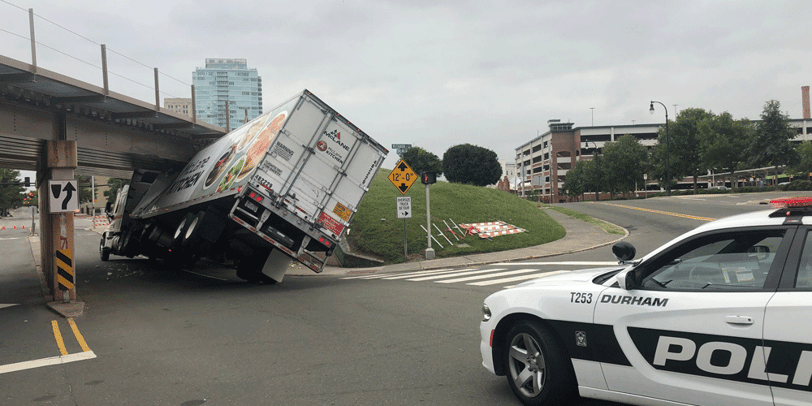Truck Driver Disqualifications Explained (Guide for Minnesota & U.S. Drivers)
Holly has been with ATS for 8 years. She started out doing oversized permits for flatbed specialized in the permits department. Shortly after that she moved into recruiting where she is still able to apply her oversized knowledge to prospective drivers. She enjoys consulting drivers on their next move by matching their qualifications and goals to various ATS programs. She loves being a resource that they can count on with this major decision.
Revised November 25, 2025
You've got your Commercial Driver's License (CDL) and you're ready to hit the road. But hold on there! What about that moving violation from three years ago, or that time you struck a pole in the shipping yard? Will carrier companies still hire you?
A lot of my days as a driver consultant at Anderson Trucking Service (ATS) are spent helping truck drivers in Minnesota, the Midwest, and across the U.S. understand what qualifies (and disqualifies) them from getting hired by the best carrier companies in the industry. While every carrier company has its own hiring standards, and those often change, one thing's for sure: if any of the issues below don't completely disqualify you, they'll definitely make recruiters pause and think twice.
Understanding what could disqualify you as a truck driver helps you focus your time on carriers where you are eligible and will help you find a company that's a better fit for your experience and goals, so let's get into it. Here are eight common disqualifiers and what you can do about them:
- Moving Violations/High CSA Score
- Living Outside of Hiring Areas
- Suspensions/Withdrawal of Driving Privileges
- Lack of Verifiable OTR Experience
- Expired Medical Card/Medical Disqualifications
- Truck Abandonments
- Criminal Background
- Failed Drug or Alcohol Tests
- Appealing a Disqualification
1. Moving Violations / High CSA Score
Trucking companies are required by the Federal Motor Carrier Safety Administration (FMCSA) to pull your Motor Vehicle Record (MVR) from the last 36 months. Violations that often trigger issues and raise red flags include:
- Reckless or careless driving
- Speeding (especially 15+ mph over limit)
- Texting or handheld phone use while driving
- Causing an accident
Department of Transportation (DOT) accidents and non-preventable accidents show up on your MVR, too.
These violations lead to a high Compliance, Safety, and Accountability (CSA) score, which can cause you to be turned away from many carrier companies.
If you have any serious moving violations that you think could be held against you, call the companies you’re interested in and be transparent about them. Ask questions. You may need to wait a few years until the violation(s) drop off your record to be considered at particular companies.
Pro Tip: Pull your MVR (in Minnesota, this can be done through the DMV) and check for violations. The older they are or the lower the CSA score, the better your chances.

2. Living Outside of Hiring Areas
It might seem obvious, but if you live outside of a company's designated hiring region, or if you regularly take home time outside of their hiring area, you'll likely be filtered out.
Pro Tip: When talking to carrier companies, be sure you understand their hiring region, and be upfront with recruiters about your home base and whether your schedule requires home time in Minnesota or across state lines (if you have family out of state or more than one house, for example).
3. Suspensions / Withdrawal of Driving Privileges
If you've had your license suspended, or your driving privileges denied or withdrawn (Captain Obvious says: Make sure you have insurance), that will show up on your background checks and will definitely raise a red flag.
Pro Tip: If you've had a suspension, make sure it's been cleared (the DMV should be able to help you here) and get documentation showing that your privileges have been restored.
4. Lack of Verifiable Experience
Unless you're applying with a training company, you'll need verifiable over-the-road (OTR) experience, usually a minimum of 6 months, and depending on what type of driving you'll be doing (flatbed, heavy haul, etc.), you'll likely need experience specific to that division.
Companies want to ensure that your experience matches the experience required for what you’re applying for. Otherwise, you could be set up to fail, and that's good for, well, nobody.
Be aware that if you've hopped jobs rapidly or frequently, or if your past carriers don't confirm your history, you'll likely be excluded.
Pro Tip: Take initiative and be proactive before calling a carrier company. Gather your prior employment verifications (CDL, driving jobs, etc.), ensure there are no gaps, and if there are, be ready to explain them to the driver recruiter.
5. Expired Medical Card
Your DOT medical certificate is part of your Motor Vehicle Record (MVR), and it must be up-to-date and correctly filed with your driver's license.
If your medical card expires, it can delay (or even block) your application with a carrier company. Your MVR shows when your card was issued, its expiration date, and any medical restrictions listed on your record.
Many trucking companies prefer drivers with at least 90 days to six months remaining on their medical card. Keeping your certification current shows companies you're a safe, healthy, and reliable professional who's compliant with FMCSA medical standards and ready to hit the road.
Medical and Health Disqualifications for Commercial Drivers
To elaborate on the above, there are certain health conditions that can temporarily, or permanently, disqualify a driver from holding or renewing a DOT medical card, such as:
- Uncontrolled high blood pressure (≥ 160/100 mmHg)
- Insulin-dependent diabetes (without an approved FMCSA exemption)
- Epilepsy or seizure disorders
- Untreated sleep apnea
- Vision worse than 20/40 in either eye (corrective lenses allowed)
- Significant hearing loss (not corrected with a hearing aid)
Also, drivers diagnosed with severe depression, bipolar disorder, or substance abuse disorders may be disqualified until their condition is verified as stable by an FMCSA-certified medical examiner.
6. Truck Abandonments
Now this one can vary from carrier to carrier depending on the circumstances of the abandonment, but at the end of the day, truck abandonments are extremely costly for the company that has to recover that truck, and many carriers will pass on drivers who have a truck abandonment on their record.
It's not a good look.
Pro Tip: If this applies to you, make sure to prepare a clear explanation and documentation of the circumstances (ex. mechanical failure, emergency) so you're ready for your call with a driver recruiter.
7. Criminal Background
Every trucking company has its own policies on criminal background checks — what they review, what they can legally ask, and which criminal convictions may prevent hiring. Some carriers aren't allowed by law to ask about your criminal history, while others require full disclosure. If a company can't ask, it's your responsibility as a driver to decide whether or not to share that information.
If you do have a criminal record and feel uncomfortable discussing it, let your recruiter know upfront (that word comes up a lot here, doesn't it?). They'll explain their company's background check policy so you understand what may disqualify you before you travel to orientation. Some have strict lifetime bans; others may accept drivers depending on how long ago the incident occurred.
Transparency saves time and frustration, especially if a background check reveals something that makes you ineligible for hire, such as these common (and serious) disqualifying offenses:
- Sexual assault
- DUI (in either a commercial or personal vehicle)
- Manslaughter or homicide
- Pending criminal charges
Pro Tip: If you're unsure about your eligibility, talk openly and honestly with your recruiter. Their job is to help you understand company policies and match you with opportunities that best fit your background. ATS, for example, reviews each case individually, and takes both time and rehabilitation into consideration.
8. Failed Drug or Alcohol Tests
There's not much gray area here: most carriers will not work with you if you’ve failed or refused a DOT drug or alcohol test. Whether it’s a pre-employment, random, or post-accident screening, you will need to go through an SAP (Substance Abuse Professional) program if you ever want to work in the trucking industry again.
Even then, it's not a guarantee. Many carriers will still pass on working with you — even if you've completed the SAP process — no matter how long ago the failure or refusal happened. In that case, you’ll need to look for "second chance" trucking companies that do accept drivers who've successfully completed the SAP program (they really do exist, so don't lose hope!).
The trucking industry is changing. With more drivers being added to the FMCSA Drug and Alcohol Clearinghouse, failure rates have increased, causing carriers to revisit their policies.
Pro Tip: If you've had a failure, do your research and look up carrier companies that are open to SAP-cleared drivers. Be ready to show documentation of your program completion.
Can Disqualified Drivers Return to the Road?
Yes; disqualified drivers can get their CDL back after meeting state-specific criteria, which typically includes:
- Completing suspension periods
- Paying reinstatement fees
- Providing proof of compliance per court or state requirements
If you do end up losing your commercial driving privileges but want to get back on the road, it's important to go through the proper reinstatement process first. Driving while disqualified can lead to steep fines, possible jail time, and lasting marks on your driving and criminal record.
How Can I Appeal a Disqualification?
- If disqualified by carrier: contact the carrier directly to find out if they have an internal appeal process and how to get the ball rolling.
- If disqualified by state/federal authority: appeals are handled through the appropriate court or state licensing agency.
Can Any Violations Disqualify You for Life?
I wish I could say "no," but it is possible (though very uncommon). A lifetime CDL disqualification usually only happens in extreme cases, like repeating serious violations or being involved in something especially severe — particularly anything involving alcohol, drugs, or a fatal crash.
In those rare situations, state or federal authorities may decide to permanently disqualify a driver from holding a CDL.
Last Stop
So, there you have it: eight of the more common roadblocks to getting hired on as a driver and, more importantly, how to overcome them. That part's up to you, and these steps are a great start:
- Pull your Motor Vehicle Record
- Update your DOT medical card
- Have your employment history verified
- Talk to carrier companies that align with your home region and experience level
At ATS, we're looking for qualified drivers in Minnesota and across the Midwest who fit the bill. Reach out and let us help you understand what flies and what doesn't so we can match you with a program that will build your future success.



